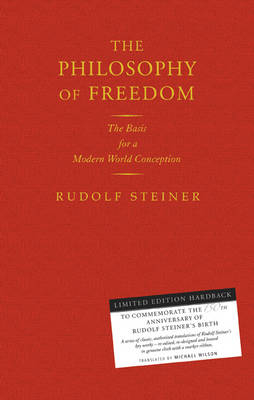
The Philosophy of Freedom
Rudolf Steiner Press (Verlag)
978-1-85584-256-4 (ISBN)
Given his energetic involvement in practical initiatives and extensive lecturing, Rudolf Steiner had little time to write books. Of those he did write - belonging almost entirely to the earlier years of his work - four titles form an indispensable introduction to his later teaching: Knowledge of the Higher Worlds, Occult Science, The Philosophy of Freedom and Theosophy. Are we free, whether we know it or not? Or is our sense of freedom merely an illusion? Rudolf Steiner tackles this age-old problem in a new way. He shows that by taking account of our own activity of thinking, we can know the reasons for our actions. And if these reasons are taken from our world of ideals, then our actions are free, because we alone determine them.
--- But this freedom cannot be settled for us by philosophical argument. It is not simply granted to us. If we want to become free, we have to strive through inner activity to overcome our unconscious urges and habits of thought. In order to do this we must reach a point of view that recognises no limits to knowledge, sees through all illusions, and opens the door to an experience of the reality of the spiritual world. Then we can achieve the highest level of evolution, and recognise ourselves as free spirits.
Rudolf Steiner (1861-1925) called his spiritual philosophy 'anthroposophy', meaning 'wisdom of the human being'. As a highly developed seer, he based his work on direct knowledge and perception of spiritual dimensions. He initiated a modern and universal 'science of spirit', accessible to anyone willing to exercise clear and unprejudiced thinking. spacer spacer From his spiritual investigations Steiner provided suggestions for the renewal of many activities, including education (both general and special), agriculture, medicine, economics, architecture, science, philosophy, religion and the arts. Today there are thousands of schools, clinics, farms and other organizations involved in practical work based on his principles. His many published works feature his research into the spiritual nature of the human being, the evolution of the world and humanity, and methods of personal development. Steiner wrote some 30 books and delivered over 6000 lectures across Europe. In 1924 he founded the General Anthroposophical Society, which today has branches throughout the world.
| Erscheint lt. Verlag | 1.6.2011 |
|---|---|
| Übersetzer | M. Wilson |
| Verlagsort | East Sussex |
| Sprache | englisch |
| Maße | 140 x 220 mm |
| Themenwelt | Geisteswissenschaften ► Philosophie ► Erkenntnistheorie / Wissenschaftstheorie |
| Geisteswissenschaften ► Religion / Theologie | |
| Weitere Fachgebiete ► Anthroposophie | |
| ISBN-10 | 1-85584-256-4 / 1855842564 |
| ISBN-13 | 978-1-85584-256-4 / 9781855842564 |
| Zustand | Neuware |
| Haben Sie eine Frage zum Produkt? |
aus dem Bereich


![Was heißt Denken?. Vorlesung Wintersemester 1951/52. [Was bedeutet das alles?] - Martin Heidegger](/media/113619842)